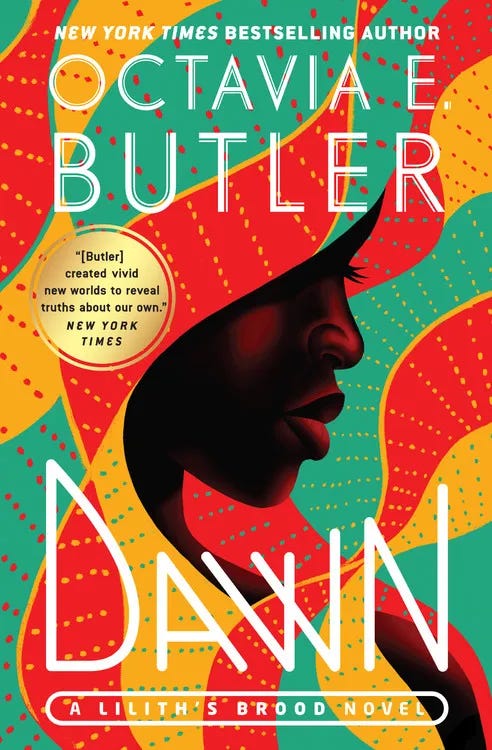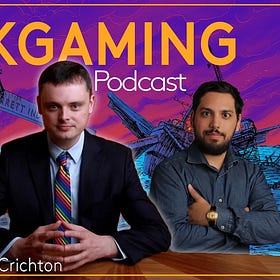Status anxiety in airplanes, our alien future, Bay Area tech-bro culture, and the UN. Plus a Riskgaming state of the union.
From Lux Capital
We led an $87 million Series B round into Modal, which is rebuilding traditional cloud infrastructure for AI-centric compute workflows. More from founder Erik Bernhardsson on X.
From around the web
1. Anxiety, now boarding
I’ve spent a decent amount of time in airports recently, and when I came across JA Westenberg’s “Boarding Group One,” I felt seen. She observes how airline boarding groups have become a perfect microcosm of our status-obsessed culture, where status anxiety has metastasized into every corner of modern life, from the cars we can’t afford to the wine we order to impress strangers, to competition in friendships and even parenting.
I don’t want to pretend I have a neat solution. I can’t tell you to renounce status and expect you to listen; if I’m being brutally honest, I wouldn’t follow that advice. We all like the way it feels to get called first and I include myself in that indictment. But I can tell you this: the way we let status rule our lives is making us miserable. It pits us against each other in a zero-sum game where even the winners can’t relax, because there’s always another rung, another group, another measure. If you’re in Group Two, you want to be in Group One. If you’re in Group One, you yearn for a private jet. There’s no end to it.
2. Homo Ridiculus
The search for status might seem essential to what it is to be human today. But what about tomorrow? This week, Laurence recommends Octavia Butler’s Dawn, the story of one of the last surviving humans, who awakens aboard a spacecraft among aliens who plan to genetically merge with humans in exchange for helping them repopulate Earth. Laurence notes that Butler’s Parable series is getting lots of attention these days for its obvious ties to the current moment (a climate apocalypse, president who wants to “make America great again”) but Dawn may be even more satisfying: it helps you recognize just how strange humans really are.
3. Valley of the decoys
As a last stop on this week’s tour through humanity’s troubled sociology, Riskgaming’s Yuma Kim directs you to Astral Codex Ten, where you will find a delightful satirical romp through Bay Area tech culture, in which men lure journalists by promising access to controversial figures at parties, then hire impersonators of those figures while pitching absurd startups. No one in the Silicon Valley ecosystem makes it out of the piece unscathed.
“Lots of people are tripped up by not condemning enough things. Imagine that you want to express discontent with the Trump administration restricting food stamps, but someone points out that it’s pretty suspicious that you condemn food insecurity for white people but you didn’t condemn the famine in Gaza equally hard. So you try condemning the famine in Gaza, and someone points out that it’s pretty suspicious that you condemn starvation when it makes Jews look like the bad guys, but you didn’t condemn the famine in Ethiopia equally hard. So you try condemning the famine in Ethiopia, but then people tell you that’s ‘telescopic altruism’, because you didn’t condemn a murder that happened in your own city. So you try condemning a murder in your own city, but it was a black-on-white murder, and people say that it’s pretty suspicious that you didn’t condemn the latest white-on-black murder equally hard. The only solution is to monitor the news 24-7, condemning each thing as soon as it happens, in exact proportion to how bad it is. But nobody has time for that. So you give us access to your Twitter account and we do it for you.
4. Slash and burn
If the outlook for humanity appears somewhat grim (at least judging by this week’s readings), the outlook for our institutions may be worse… Happy Friday! For example, with NIH funding slowing down, a group of researchers looked at a counterfactual: What would have happened if NIH funding had historically been 40% lower, about the amount by which U.S. President Donald Trump has proposed cutting it in next year’s budget. The authors find that roughly half of all FDA-approved drugs since 2000 cite research that would have been unfunded under such cuts. H/t scientist-in-residence Sam Arbesman.
We found frequent links between NIH funding and downstream pharmaceutical research. Of the 557 drug approvals in our sample, 331 (59.4%) have a patent that cites at least one research publication acknowledging NIH support. Indeed, more than half of approved drugs (286, or 51.4%) are linked to at-risk research—research funded by grants that would have been cut under a 40% budget reduction.
5. Too big to function?
Finally, in the wake of last month’s UN General Assembly, even that institution has acknowledged its struggles to fulfill its mandate in the face of budget cuts, institutional bloat, and overwhelming bureaucracy. But a new biography of U Thant, the organization’s first non-European leader, may be a rallying cry to turn things around. As Timothy McLaughlin writes in a Bloomberg review, “Thant and the UN’s early ideals may persuade a new generation of officials that it’s an organization worth reinvigorating and refocusing. To do that, they will need a leader of comparable pragmatism and talent.” I’ll leave you this week with one of my favorite quotes, which happens to be from Thant.
As we watch the sun go down, evening after evening, through the smog across the poisoned waters of our native earth, we must ask ourselves seriously whether we really wish some future universal historian on another planet to say about us: ‘With all their genius and with all their skill, they ran out of foresight and air and food and water and ideas,’ or, ‘They went on playing politics until their world collapsed around them.’
From Riskgaming
Riskgaming State of the Union
Greetings from Asia, where I am on vacation eating so much good food just to prove that one can out-eat Ozempic. Do let me know if America still has a government at midnight.
Sugary foods, black holes, Vegas
Sweet-and-not-so-sour chicken, for the love of science, and getting rich by losing in Vegas. Plus Ian Curtiss and Pijus Krūminas talk wargames.






